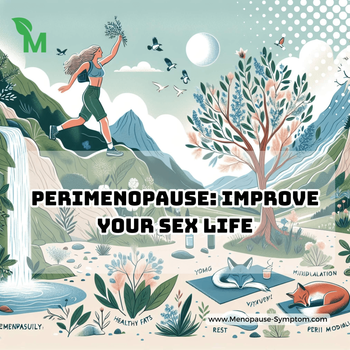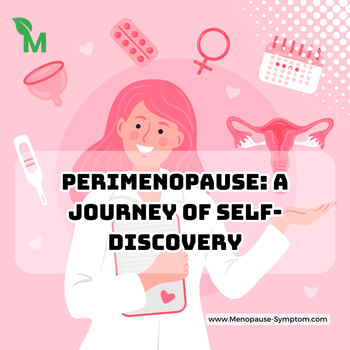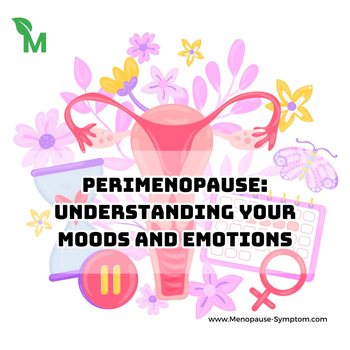It is a natural process in a woman's life and there is no reason to worry. Although perimenopause can bring unpleasant symptoms, understanding it clearly will help you feel more confident and secure.
1. What is Perimenopause?
Perimenopause begins in your 40s, but can start earlier or later depending on the individual. During this stage, a woman's body begins to reduce the production of the hormones estrogen and progesterone. After this stage, women will enter menopause - the cessation of menstruation, meaning that ovulation does not occur, menstruation will disappear and the ability to reproduce will no longer be possible. This can cause changes in the menstrual cycle, emotions and overall health.
2. Symptoms of Perimenopause
Although perimenopause is considered a normal part of a woman's life, it is undeniable that the symptoms during this stage will cause discomfort for women. These symptoms may include:
Menstrual disorders: Hormonal changes affect the ovaries' release of eggs and this can cause menstruation to be delayed or shortened or stop for a few months. Menstrual bleeding is lighter or heavier and occurs after the age of 40.
Hot flashes: it can vary in the duration of hot flashes or increase in intensity throughout the day and night, accompanied by snoring and difficulty sleeping. These hot flashes can last from 2-5 years. When estrogen levels decrease, blood vessels can dilate rapidly and increase skin temperature. This phenomenon can cause a hot feeling that spreads from the chest to the shoulders, neck and head. Excessive sweating and drying will cause the skin to lose a lot of heat, leading to feeling cold, tired and lethargic. Hot flashes can last from 30 seconds to 30 minutes.
Mood changes: Hormonal changes can lead to many unpleasant symptoms, making women prone to mood swings, anxiety, irritability and depression.
3. Don't Worry, There Are Solutions!
When feeling anxious about perimenopause, remember that there are many ways to minimize symptoms. This includes making lifestyle changes and seeking medical help if necessary. Here are some solutions:
Balanced diet: Eating a healthy diet helps promote overall health. Foods rich in omega-3, calcium and vitamin D can help during perimenopause.
Exercise regularly: Physical activity helps reduce stress, improve mood and improve health. Choose an activity that you enjoy and do it regularly.
Meditation and yoga: These will calm your mind and help to increase the balance in your spiritual life. Meditation and yoga can be very helpful in dealing with the mood swings of perimenopause.
4. Seek Support
Don't hesitate to seek support from friends, family or groups of other women going through the same thing. Sharing your feelings and experiences will help you feel more connected and less alone. Not only will this provide comfort, but you may also get helpful tips from others who have gone through similar situations.
5. Medical Treatment
If your perimenopause symptoms become severe and affect your quality of life, consult your doctor. There are many treatments, including hormone replacement therapy (HRT), that can help reduce symptoms and improve comfort.
However, it is important to seek help from a health professional to ensure that you are treated properly and safely.
6. Embrace the New Phase
Perimenopause is not an end, but a new beginning. This is a time for you to explore new things and enjoy life from a different perspective. Remember that each stage of life is a new opportunity. Menopause is not something negative, but a normal part of the natural process.
7. The Importance of Self-Care
During perimenopause, don't forget to take time for yourself. Self-care not only makes you feel better, but also brings many health benefits. Try activities like reading, taking part in art, going for a walk, or participating in activities that you enjoy.
8. Technology and Perimenopause
Modern technology can help women in perimenopause a lot. Period and symptom tracking apps can provide valuable information that will help you better understand your body. Regularly monitoring your body will help you recognize changes and adjust your lifestyle accordingly.
9. Listen to Your Body
The key to getting through perimenopause is listening to your body. Every woman’s experience is different, so find what works best for you. Be proactive in seeking out information and applying what you learn.
10. Knowledge Is Power
Educating yourself about perimenopause and menopause is an important part of reducing your anxiety. When you are well-informed about hormonal changes, your menstrual cycle, and possible symptoms, you will be better prepared for them, and you will feel more confident in dealing with them.
11. Family Support
An important factor in helping women overcome perimenopause is family support. Family is an important source of emotional energy for each person. Sharing with loved ones about what you are going through can help them understand your condition better and help you overcome this stage.
12. Seek Information from Experts
Don't hesitate to seek out courses, seminars, or talks from women's health experts. These activities can help you gain more insight into perimenopause and how to manage symptoms.
13. Explore Natural Solutions
Many natural remedies can help improve perimenopause symptoms. Herbs such as dong quai or ginseng have also been used to support women during this stage. However, before taking any measures, consult your doctor to ensure safety.
14. A New Phase of Life
Finally, remember that perimenopause is just a phase in your life. Look at it as an opportunity to grow, explore, and enjoy life. There is nothing to worry about. Let's approach it with positivity and confidence.
Conclusion
Perimenopause is a natural part of every woman's life, and there is nothing to worry about. With good preparation and a positive attitude, you can get through this stage with ease and confidence. Take care of yourself, seek support when needed, and remember that this is not the end but a promising new beginning. Wishing you health and happiness in every stage of life!
Source: Team MPS compiled, analyzed and wrote. Please dont reup without source. Many thanks.

Perimenopause: Improve Your Sex Life
Invalid Date
Perimenopause is a natural stage in a woman's life, usually starting at the age of 40. Perimenopause is a stage where a woman's body experiences many psychological and physiological changes, as well as health problems before entering menopause.

Perimenopause: A Journey Of Self-Discovery
09.02.2024
Perimenopause is not just a biological stage in a woman's life, but also a meaningful journey that helps us become more aware of ourselves.

Perimenopause: Understanding Your Moods And Emotions
Invalid Date
Perimenopause is an important stage in a woman's life, usually occurring between the ages of 40 and 55. This stage involves not only physiological changes in the body but also changes in mood and emotions.
